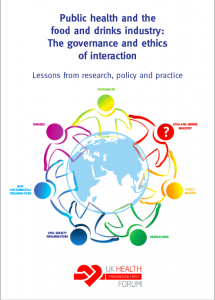
- they don’t always show up;
- they may be co-opted and drawn into inappropriate funding arrangements and partnerships
- their role as independent monitors and watchdogs of corporate activity can be compromised;
- their presence can enhance the credibility of the MSH model and increase the risk of image transfer (white/blue washing)
It is important that WHO does not let corporations and venture philanthropies in as funders and straight to the decision-making tables through the many Multi-Stakeholder approaches springing up. TNcs and venture philanthropies should not be granted inappropriate roles e.g. on boards and other public-decision making arrangements.
Why IBFAN is so concerned about WHO’s redefining of Conflicts of Interest. (Thanks to Lida Lhotska)
A key problem is that WHO has attempted to redefine traditional legal CoI concepts in order to fit the ‘stakeholderisation’ of our public nutrition and health. WHO’s Tools for Safeguarding against possible Conflicts of Interest in Nutrition Programmes and its Framework for Engagement with Non State Actors (FENSA) both follow the problematic CoI Guidance that was devised for the Scaling Up Nutritioninitiative (SUN), as does WHO’s 13th Global Plan of Work. While on a superficial level, all these documents appear to address conflicts of interest, they contain weaknesses that instead promote inappropriate relationships /partnerships with the Private Sector.
One confusing aspect of all these documents is that they keep referring to conflicts being BETWEEN entities – rather than WITHIN a person or an entity. The fact is COI can arise WITHIN people, governments or any institution BECAUSE of inappropriate interactions with the private sector.
Para 44 of the Global Strategy on Infant and Young Child feeding tries to prevent inappropriate interactions by assigning to companies TWO roles and TWO roles only: 1: to make safe products and 2: to comply with the Code and WHA resolutions. Companies could make a positive contribution to child health by focusing on doing these two things well. We all fall into a trap and make things more problematic when we give them other roles or more responsibilities such as education or breastfeeding promotion. (CLICK HERE for one example – Nestlé new Breastfeeding Campaign )
Worse still, when we invite them into policy-making spheres.
So while WHO’s CoI Guidance/tools contain some interesting and important information, they are not adequate safeguards against CoI or other forms of undue influence – safeguards that we need at national level to protect policy making and programme implementation. They may in fact undermine any existing safeguards. It is not helpful to ask governments to follow a CoI guidance that will not prevent entanglements and instead increases risks of CoI (and institutional corruption) at national level.
.
